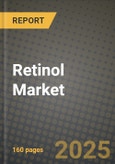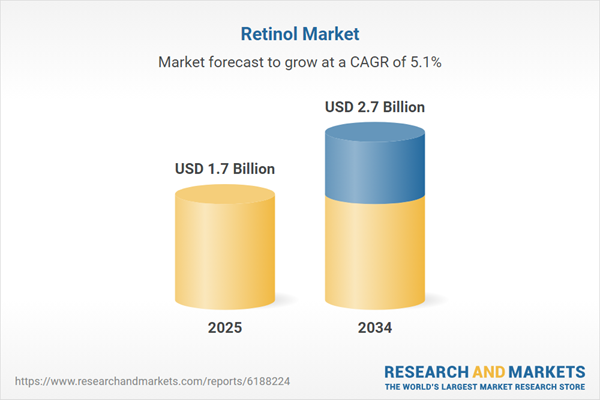The Retinol Market is gaining momentum globally, driven by rising consumer awareness of skincare, anti-aging, and dermatological health. Retinol, a derivative of vitamin A, is widely used in topical formulations for its ability to reduce fine lines, smooth skin texture, and treat acne. It is a key active ingredient in serums, creams, and lotions and is increasingly featured in both over-the-counter products and prescription-grade skincare solutions. The market spans across personal care, pharmaceuticals, and nutraceuticals, with premium skincare brands leading the innovation race. Growing demand for multifunctional and dermatologist-recommended products, particularly among millennials and Gen Z, is fueling consistent growth. As consumers seek evidence-based skincare, brands are focusing on clinical validation, clean-label formulations, and combining retinol with calming or hydrating agents to reduce irritation and enhance efficacy.
The retinol market experienced steady growth, particularly in emerging economies where skincare consciousness is expanding due to increased internet penetration and beauty influencer marketing. Brands launched retinol-based formulations designed for sensitive skin, integrating peptides, niacinamide, and hyaluronic acid to reduce side effects like peeling or redness. The pharmaceutical segment also witnessed a rise in demand for prescription-strength retinoids, particularly for acne and hyperpigmentation. Meanwhile, e-commerce continued to dominate distribution, with direct-to-consumer skincare startups leveraging digital platforms to target niche segments. Regulatory compliance around vitamin A concentrations became a focal point for manufacturers, especially in Europe and North America. Sustainable packaging and cruelty-free product development were also key differentiators in the market, aligning with broader consumer preferences around ethical beauty.
The retinol market is expected to evolve with the development of encapsulated and slow-release delivery systems aimed at improving skin tolerance and enhancing long-term effectiveness. Skincare companies will increasingly invest in microbiome-friendly and vegan-certified retinol products to meet changing consumer demands. Demand for retinol alternatives, such as bakuchiol, will rise among consumers seeking natural or gentler anti-aging solutions, although retinol will remain the gold standard. Personalization in skincare, backed by AI-driven skin diagnostics, is anticipated to create customized retinol regimens based on individual skin types and concerns. With rising competition, companies will focus on education-based marketing to promote safe and effective retinol usage. However, concerns about misuse, overexposure, and counterfeit products will require better regulatory oversight and public awareness campaigns.
Key Insights: Retinol Market
- Encapsulated and time-release retinol formulations are gaining traction for offering controlled delivery with reduced skin irritation.
- Clean beauty trends are driving demand for vegan, cruelty-free, and fragrance-free retinol-based skincare products.
- Combination skincare products featuring retinol with hydrating or soothing ingredients like ceramides and hyaluronic acid are growing in popularity.
- Rise of influencer-led education and dermatology-backed marketing is helping build trust around daily retinol use in skincare routines.
- Consumers are exploring retinol alternatives like bakuchiol and retinaldehyde, especially in sensitive skin and natural product segments.
- Increasing consumer focus on anti-aging and preventive skincare is boosting demand for clinically proven ingredients like retinol.
- Growth in e-commerce and social media marketing is expanding market reach, especially among younger, digitally engaged demographics.
- Rising prevalence of acne and pigmentation disorders is driving clinical adoption of retinol in dermatological treatments.
- Innovation in delivery systems and supportive formulations is improving user experience and broadening the consumer base.
- Potential for skin irritation, photosensitivity, and long-term misuse of high-concentration retinol products remains a major concern, necessitating clear product labeling, consumer education, and stricter regulation to ensure safe application and maintain trust in the ingredient's efficacy.
Retinol Market Segmentation
By Type
- Natural
- Synthetic
By Application
- Personal Care and Cosmetics
- Dietary Supplements
- Food and Beverage
- Animal Feed
- Other Applications
By Distribution Channel
- Offline
- Online
Key Companies Analysed
- Archer Daniels Midland Company
- BASF SE
- Bayer AG
- L'Oréal Uruguay S.A
- GlaxoSmithKline plc
- Merck KGaA
- Estée Lauder Inc.
- Eastman Chemical Company
- DSM
- Givaudan
- Adisseo
- Piramal Pharma Solutions
- Kingdomway Nutrition Inc.
- Nutraceutical International Corporation
- Zhejiang Medicine Co. Ltd
- Kate Somerville US
- Beauty Solutions LTD
- Biotics Research Corporation
- Divi's Nutraceuticals
- Drunk Elephant LLC
- DERMAdoctor
- Eluminex Biosciences
- Sunday Riley
- Nutrilo GmbH
- The Vitamins Company
Retinol Market Analytics
The report employs rigorous tools, including Porter’s Five Forces, value chain mapping, and scenario-based modeling, to assess supply-demand dynamics. Cross-sector influences from parent, derived, and substitute markets are evaluated to identify risks and opportunities. Trade and pricing analytics provide an up-to-date view of international flows, including leading exporters, importers, and regional price trends.Macroeconomic indicators, policy frameworks such as carbon pricing and energy security strategies, and evolving consumer behavior are considered in forecasting scenarios. Recent deal flows, partnerships, and technology innovations are incorporated to assess their impact on future market performance.
Retinol Market Competitive Intelligence
The competitive landscape is mapped through proprietary frameworks, profiling leading companies with details on business models, product portfolios, financial performance, and strategic initiatives. Key developments such as mergers & acquisitions, technology collaborations, investment inflows, and regional expansions are analyzed for their competitive impact. The report also identifies emerging players and innovative startups contributing to market disruption.Regional insights highlight the most promising investment destinations, regulatory landscapes, and evolving partnerships across energy and industrial corridors.
Countries Covered
- North America - Retinol market data and outlook to 2034
- United States
- Canada
- Mexico
- Europe - Retinol market data and outlook to 2034
- Germany
- United Kingdom
- France
- Italy
- Spain
- BeNeLux
- Russia
- Sweden
- Asia-Pacific - Retinol market data and outlook to 2034
- China
- Japan
- India
- South Korea
- Australia
- Indonesia
- Malaysia
- Vietnam
- Middle East and Africa - Retinol market data and outlook to 2034
- Saudi Arabia
- South Africa
- Iran
- UAE
- Egypt
- South and Central America - Retinol market data and outlook to 2034
- Brazil
- Argentina
- Chile
- Peru
Research Methodology
This study combines primary inputs from industry experts across the Retinol value chain with secondary data from associations, government publications, trade databases, and company disclosures. Proprietary modeling techniques, including data triangulation, statistical correlation, and scenario planning, are applied to deliver reliable market sizing and forecasting.Key Questions Addressed
- What is the current and forecast market size of the Retinol industry at global, regional, and country levels?
- Which types, applications, and technologies present the highest growth potential?
- How are supply chains adapting to geopolitical and economic shocks?
- What role do policy frameworks, trade flows, and sustainability targets play in shaping demand?
- Who are the leading players, and how are their strategies evolving in the face of global uncertainty?
- Which regional “hotspots” and customer segments will outpace the market, and what go-to-market and partnership models best support entry and expansion?
- Where are the most investable opportunities - across technology roadmaps, sustainability-linked innovation, and M&A - and what is the best segment to invest over the next 3-5 years?
Your Key Takeaways from the Retinol Market Report
- Global Retinol market size and growth projections (CAGR), 2024-2034
- Impact of Russia-Ukraine, Israel-Palestine, and Hamas conflicts on Retinol trade, costs, and supply chains
- Retinol market size, share, and outlook across 5 regions and 27 countries, 2023-2034
- Retinol market size, CAGR, and market share of key products, applications, and end-user verticals, 2023-2034
- Short- and long-term Retinol market trends, drivers, restraints, and opportunities
- Porter’s Five Forces analysis, technological developments, and Retinol supply chain analysis
- Retinol trade analysis, Retinol market price analysis, and Retinol supply/demand dynamics
- Profiles of 5 leading companies - overview, key strategies, financials, and products
- Latest Retinol market news and developments
Additional Support
With the purchase of this report, you will receive:- An updated PDF report and an MS Excel data workbook containing all market tables and figures for easy analysis.
- 7-day post-sale analyst support for clarifications and in-scope supplementary data, ensuring the deliverable aligns precisely with your requirements.
- Complimentary report update to incorporate the latest available data and the impact of recent market developments.
This product will be delivered within 1-3 business days.
Table of Contents
Companies Mentioned
- Archer Daniels Midland Company
- BASF SE
- Bayer AG
- L'Oréal Uruguay S.A
- GlaxoSmithKline PLC
- Merck KGaA
- Estée Lauder Inc.
- Eastman Chemical Company
- DSM
- Givaudan
- Adisseo
- Piramal Pharma Solutions
- Kingdomway Nutrition Inc.
- Nutraceutical International Corporation
- Zhejiang Medicine Co. Ltd.
- Kate Somerville US
- Beauty Solutions Ltd.
- Biotics Research Corporation
- Divi's Nutraceuticals
- Drunk Elephant LLC
- DERMAdoctor
- Eluminex Biosciences
- Sunday Riley
- Nutrilo GmbH
- The Vitamins Company
Table Information
| Report Attribute | Details |
|---|---|
| No. of Pages | 160 |
| Published | October 2025 |
| Forecast Period | 2025 - 2034 |
| Estimated Market Value ( USD | $ 1.7 Billion |
| Forecasted Market Value ( USD | $ 2.7 Billion |
| Compound Annual Growth Rate | 5.0% |
| Regions Covered | Global |
| No. of Companies Mentioned | 25 |









